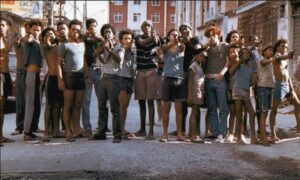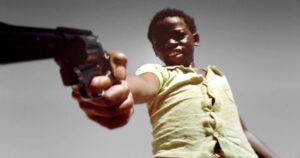Right to Education as the Source of Alternatives in City of God
By M. Doğukan Kuru

City of God (2002), co-directed by Fernando Meirelles and Katia Lund, is a film about the emergence of two children in the favelas (ghettos) of Rio de Janeiro. Originally published as a novel, the work is a semi-autobiography by the author Paulo Lins. The story takes place during the implementation of the government’s dispersal policies, aimed at relocating favela residents to the country’s suburbs. City of God, one of these suburbs, is where the two main characters of the story are born and raised: Rocket and Lil’ Ze. Their divergent paths in the suburb reveal the failed policies of the government bodies in their attempt to deter criminal activities in the metropolitan areas. Rocket seizes the opportunity to become a photographer by capturing Lil’ Ze’s criminal activities, while Lil’ Ze becomes a drug dealer. This symbiotic relationship grants Rocket employment as a photographer in a local newspaper and infamy to Lil’ Ze as a major power in the region. Their different paths, which emerge due to the lack of investment in the region, are the consequences of the sense of stagnation encouraged by the government’s policies. By dispersing favelas and relocating their residents, the government enacts policies that offer no real solutions to the problems faced by the people whose lives are intertwined with these neighborhoods. By narrating the story from two different perspectives, exploring Rocket’s and Lil’ Ze’s journeys, the film highlights the limitations that arise from maintaining the status quo in the region. It portrays a never-ending story of a group of people trapped within circumstances they cannot change, generation after generation. The lack of opportunities to lead a better life is perpetuated day by day due to the absence of investments. Rocket, trained solely through his fortunate encounter with Lil’ Ze’s crimes, manages to find a way out of the favela’s fate. In contrast to Lil’ Ze’s storyline, which explores the limited possibilities of survival within the favelas, Rocket’s education provides him with the opportunity to overcome the constraints of this system. This demonstrates the benefits of and the need for political entities to uphold the right to education. The film explicitly portrays the people of the City of God neighborhood as the victims of the government’s failure to provide resources for their prosperity. These people are not governed by modern thought; instead, they live in accordance with the ideology of the ancien régime, where the long-buried concept of the “great chain of being” was the dominant political philosophy. Escaping from this dogmatic hierarchical structure is possible through the education of the masses, regardless of their backgrounds. This is exemplified through Rocket’s story, while Lil’ Ze’s story shows that the tipping point for intellectual development is often a state of catastrophe, resulting in a repetitive cycle of failure.

